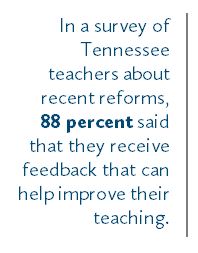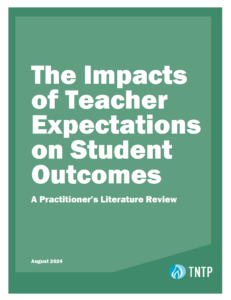It’s pretty easy for teachers to be skeptical of new evaluation systems, particularly with all the people jumping up and down and proclaiming that they are intended only to find and fire the bad teachers, and that the system will only create another painful bureaucratic process. That has certainly been the case in Tennessee, where I live and where the early media coverage of the state’s efforts to modernize its evaluation system painted a grim picture of frustrated teachers seeing no benefits from all the changes.
But is that actually true? Tennessee decided to try to find out by doing the obvious: asking teachers what they think.
First, some context. I’ve been working in Tennessee for nine years, and I can tell you: the changes here have been big, and they’ve been fast. But they’ve also been necessary. In the past two years, Tennessee has gone from a state where teachers were evaluated and received feedback twice in a 10-year period to one where teachers receive multiple opportunities for feedback annually. Policymakers made some hard choices along the way: making student growth a significant factor in evaluations, and including innovations like student surveys in the new system. It all amounted to a giant leap, and it would have been easy to become paralyzed by endless “what-ifs.”
But that’s not what happened. When I was an administrator in Memphis, I saw teachers and union leaders working together with principals and central office leaders to not only digest, but implement all of the changes. We shared a single focus: to align our systems at all levels to improve student achievement. At the district level, that meant doing relatively easy things, like collaborating with the union to create a weekly meeting place where teachers could ask questions and resolve specific issues as they arose, and inviting teachers to lead working groups that helped shape policies and practices. But it also meant doing tough, unpopular things, like passing seniority-blind staffing policies.
The reforms promised a sweet incentive to teachers: the sort of frequent feedback that can help them improve. The question, though, was whether teachers would actually get that feedback and whether all the hard changes would prove worthwhile.
Now, the answers we’ve been waiting for. Overall, it appears that teachers are starting to see the rewards of this approach. That’s the takeaway from the second TELL (Teaching, Empowering, Leading, and Learning) Tennessee survey, which gathers teachers’ thoughts on their working conditions and the reforms the state has undertaken over the past two years. Teachers take the survey online anonymously, so it’s a good window into how they really feel.

In the 2013 survey, 88 percent of teachers said that they receive feedback that can help improve their teaching. Also, 84 percent agreed that they are recognized for their accomplishments, and 83 percent felt consistently supported by school leadership. These results are promising. (In The Irreplaceables and Greenhouse Schools, we found compelling evidence that recognition, feedback and support can help schools retain their best teachers.) Also promising: nearly nine out of 10 teachers felt that they have autonomy and are trusted to make the best professional decisions for their students.
Before you start wondering if we put something in the water, some key findings show there’s still room to improve. For one, there was a slight decrease in the percentage of teachers who felt that the procedures for being evaluated are consistent—it was 79 percent, down from 88 percent two years ago. And the percentage of teachers who agreed that teacher performance is assessed objectively also decreased slightly during that two-year period, from 88 percent to 84 percent. Tennessee needs to keep a close eye on these trends to ensure teachers continue to feel confident in the system.
While everything hadn’t been flawless, teachers’ responses counter the hand-wringing narratives that have dogged Tennessee over the past two years. The sky never fell. The work is far from over but, according to teachers, things are moving in the right direction. It’s yet one more reminder to be cautious about overstating the impact—positive or negative—of a new policy change before it has been implemented.








